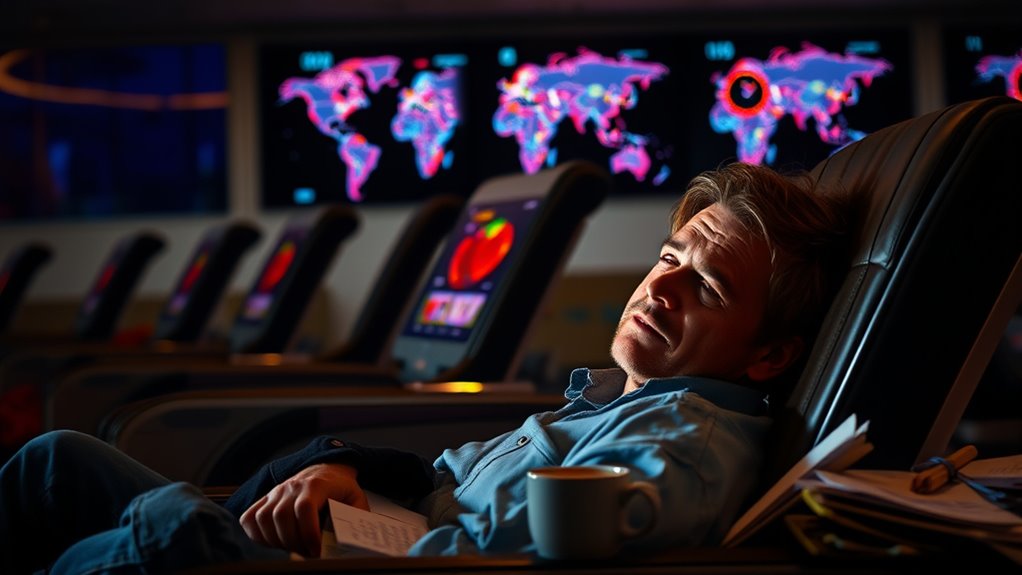Jet lag happens when your internal circadian rhythm struggles to adjust to new time zones, disrupting your sleep, hormones, and alertness. Your body’s internal clock normally follows a 24-hour cycle synchronized with natural light-dark patterns. When you travel across time zones, this rhythm gets out of sync, causing fatigue, insomnia, and concentration issues. By understanding how light exposure and melatonin help reset your clock, you’ll discover effective ways to minimize jet lag’s effects.
Key Takeaways
- Jet lag results from misalignment between the body’s circadian rhythms and new time zones.
- The internal clock struggles to adjust, causing fatigue, insomnia, and concentration issues.
- Melatonin hormone helps regulate sleep-wake cycles and can be supplemented to ease jet lag symptoms.
- Strategic light exposure can accelerate circadian realignment during travel across time zones.
- Combining melatonin with light therapy improves the body’s adaptation to local time faster.

Have you ever wondered why you feel exhausted and disoriented after crossing multiple time zones? It’s because your body’s internal clock, known as your circadian rhythms, gets out of sync with the new local time. Your circadian rhythms are like a finely tuned orchestra, regulating your sleep-wake cycle, hormone release, body temperature, and other essential functions over a 24-hour period. When you travel across time zones, these rhythms struggle to adjust, leading to symptoms like fatigue, insomnia, and difficulty concentrating. Your body’s internal clock is synchronized with the light-dark cycle of your original location, so suddenly shifting to a different time zone throws it off balance.
One common way to help realign your circadian rhythms is through the use of melatonin supplements. Melatonin is a hormone naturally produced by your pineal gland in response to darkness, signaling to your body that it’s time to sleep. When you travel east or west, your body might continue to produce melatonin according to your original schedule, even when it’s daytime at your destination. This mismatch can deepen feelings of jet lag. Taking melatonin supplements at strategic times can help signal to your body that it’s time to rest, promoting a quicker adjustment to the new time zone. For example, if you’re traveling east and need to sleep earlier, taking melatonin in the evening local time can encourage your body to feel sleepy. Conversely, if traveling west, taking melatonin later in the evening can help shift your sleep cycle accordingly.
It’s important to understand that melatonin isn’t a magic cure, but it can be an effective tool when used correctly. Timing matters: taking melatonin too early or too late can disrupt your sleep further or have little effect. Experts often recommend taking it about 30 to 60 minutes before your desired bedtime in the new time zone. Combining melatonin supplements with exposure to natural light during the day can further reinforce your body’s adjustment. Light exposure is a powerful cue for your circadian rhythms; morning light helps reset your internal clock for eastward travel, while evening light can support westward shifts.
Frequently Asked Questions
Can Jet Lag Affect Mental Health Long-Term?
Jet lag can affect your mental health long-term by causing circadian disruption, which impacts your sleep-wake cycle. This disruption may lead to mood disturbances like anxiety or depression if unresolved. When your internal clock stays out of sync for extended periods, it can strain your mental well-being. To minimize these effects, prioritize good sleep habits, manage exposure to natural light, and give yourself time to recover after travel.
Are There Natural Remedies to Minimize Jet Lag?
Imagine you’re in the 1920s and seeking natural remedies for jet lag. You can try melatonin supplements to regulate your sleep cycle or explore herbal remedies like valerian root and chamomile tea. These options may help reduce symptoms and restore your internal clock. Remember, consistency is key, and consulting a healthcare professional guarantees safe use. Natural remedies can be effective, but patience and proper sleep hygiene matter most.
How Does Age Influence Jet Lag Recovery?
As you age, recovery from jet lag can take longer because of age-related sleep changes and alterations in elderly circadian rhythms. Your body’s internal clock becomes less flexible, making it harder to adjust quickly to new time zones. You might find it helpful to expose yourself to natural light during the day and maintain a consistent sleep schedule, which can aid your circadian rhythms and improve recovery time.
Can Frequent Travelers Develop Immunity to Jet Lag?
Frequent travelers often develop a sort of resilience, but they don’t fully build immunity to jet lag. About 25% of people report less severe symptoms after repeated trips, likely because their circadian rhythm adapts over time. However, travel fatigue still hits, especially when crossing multiple time zones. While some adaptation occurs, continuous exposure keeps the risk of disrupted sleep and fatigue persistent, so immunity remains unlikely.
What Role Do Genetics Play in Jet Lag Severity?
Genetics considerably influence how you experience jet lag through genetic predispositions and chronotype variations. Your genetic makeup can determine your body’s internal clock, affecting your sleep-wake cycles and how quickly you adjust to new time zones. If you have certain genetic traits, you might find jet lag more severe or easier to manage. Understanding these factors helps tailor strategies to minimize jet lag’s impact based on your unique genetic profile.
Conclusion
Understanding the science behind jet lag helps you manage it better. For instance, imagine a business traveler crossing multiple time zones who adjusts their schedule gradually before departure. By following these strategies, you can minimize fatigue and restore your internal clock faster. Recognizing how your body reacts to time shifts empowers you to take proactive steps. With a little planning, you’ll recover quicker and enjoy your trip more, turning jet lag from a hurdle into a manageable challenge.









